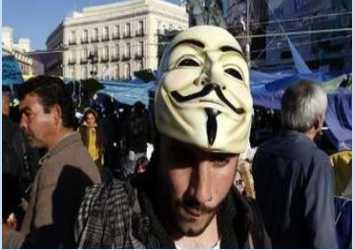Three hackers considered responsible for the Spain international organization Anonymous and accused of attacks against official websites have been arrested, police said Friday. These "hackers" who were arrested in Barcelona, Valencia and Almeria were "computer experts" capable of "encrypt" their trade, said the head of the Brigade of Technological Investigation of the Spanish police.
Two of the hijackers "had no internet connection at home" so as not to arouse suspicion and accessed the Web via wireless connections from neighbors, police said at a press conference to introduce this, the "first" in Spain against Anonymous. Anonymous is an "organization of hackers organized into independent cells" that launch coordinated attacks against websites, including through a myriad of computers infected with viruses and controlled remotely.
This organization is considered a "threat" by NATO to the risk of hacking or lock it places on computer systems of the Atlantic Alliance, according to Spanish police. Anonymous is known for attacks against websites of U.S. credit cards Visa and MasterCard, in response to their decision to block payments to the publishing site of confidential information Wikileaks.
This organization has already been referred by police operations in the United States and the United Kingdom. The home of one of the three hijackers, investigators have found a computer server from which attacks were carried out against government sites in Egypt, Algeria, Libya, Iran, Chile, Colombia and New Zealand.
This material was found in Gijon, during a search at the home of a 31 year old man suspected of coordinated attacks and was himself arrested in Almeria. From the same server, attacks were also launched against the PlayStation online store of Japanese electronics giant Sony, the sites of Spanish banks BBVA and Bankia and the Italian electricity group Enel.
These pirates are also accused of recently conducted attacks against the websites of the Spanish Parliament, the regional police of Catalonia, the Electoral Commission or the Spanish union UGT. These attacks were mostly carried out by "denial of service," said Commissioner Vazquez, which is to paralyze an Internet service with a flood of simultaneous requests.
The three hijackers "helped people who wanted to participate in attacks to configure their computers" and also had a "manual on how to conserve anomymat Internet," said the policeman. 


Two of the hijackers "had no internet connection at home" so as not to arouse suspicion and accessed the Web via wireless connections from neighbors, police said at a press conference to introduce this, the "first" in Spain against Anonymous. Anonymous is an "organization of hackers organized into independent cells" that launch coordinated attacks against websites, including through a myriad of computers infected with viruses and controlled remotely.
This organization is considered a "threat" by NATO to the risk of hacking or lock it places on computer systems of the Atlantic Alliance, according to Spanish police. Anonymous is known for attacks against websites of U.S. credit cards Visa and MasterCard, in response to their decision to block payments to the publishing site of confidential information Wikileaks.
This organization has already been referred by police operations in the United States and the United Kingdom. The home of one of the three hijackers, investigators have found a computer server from which attacks were carried out against government sites in Egypt, Algeria, Libya, Iran, Chile, Colombia and New Zealand.
This material was found in Gijon, during a search at the home of a 31 year old man suspected of coordinated attacks and was himself arrested in Almeria. From the same server, attacks were also launched against the PlayStation online store of Japanese electronics giant Sony, the sites of Spanish banks BBVA and Bankia and the Italian electricity group Enel.
These pirates are also accused of recently conducted attacks against the websites of the Spanish Parliament, the regional police of Catalonia, the Electoral Commission or the Spanish union UGT. These attacks were mostly carried out by "denial of service," said Commissioner Vazquez, which is to paralyze an Internet service with a flood of simultaneous requests.
The three hijackers "helped people who wanted to participate in attacks to configure their computers" and also had a "manual on how to conserve anomymat Internet," said the policeman.



No comments:
Post a Comment